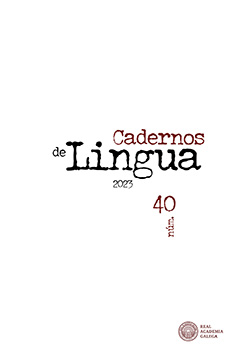An uncertain future: the “ir + inf ” and “haber (de) + inf ” variation in the contemporary oral galician language
DOI:
https://doi.org/10.32766/cdl.40.820Keywords:
future, Galician, evidentiality, corpus, variationismAbstract
This paper analyzes the future expression variation in contemporary oral Galician. This language has mechanisms for expressing futurity that go beyond the synthetic future: periphrases with <em>ir</em> and <em>haber</em> + infinitive, on the one hand, and the use of the present for future, on the other (Álvarez & Xove 2002; Freixeiro Mato 2006). Forms with <em>ir</em> and <em>haber</em> coexist for the future temporal reference and will be the protagonists of the present investigation. What linguistic factors favor each of the forms? Does <em>haber</em> +
<em>inf</em>. conserve uses derived from its deontic origins? How are both forms related to their respective processes of grammaticalization? With that in mind, 150 examples of the periphrastic future (<em>ir</em> + <em>inf</em>.) and 150 examples of the future with <em>haber</em> (<em>haber</em> (<em>de</em>) + <em>inf</em>.) were extracted from the Computerized Oral Corpus of the Galician Language and coded according to various linguistic factors. After a variationist analysis using the statistical program Goldvarb/Vabrul, the quantitative results for the statistically significant factors are shown. Next, we provide some analytical readings of this variation from usage-based linguistics. Finally, this work sheds light on the fine boundaries between temporality and modality regarding the future, as well as on these competing forms’ possible grammaticalization processes.
Downloads
References
Aaron, Jessi E. (2010): Pushing the envelope: Looking beyond the variable context, Language Variation and Change. 22(1), 1-36.
Aikhenvald, Alexandra Y. (2011): The grammaticalization of evidentiality, en Bernd Heine e Heiko Narrog (eds.), The Oxford Handbook of Grammaticalization. Oxford: Oxford University Press, online.
Álvarez, Rosario e Xosé Xove (2002): Gramática da lingua galega. Vigo: Galaxia.
Benveniste, Émile (1968): Mutations of linguistic categories, en W. P. Lehmann & Malkiel Yakov (eds.), Directions for historical linguistics: A symposium. Austin: University of Texas Press, 83-94.
Bybee, Joan (2010): Language, usage and cognition. Cambridge: Cambridge University Press.
Bybee, Joan, Revere Perkins e William Pagliuca (1994a): Future, en Joan Bybee, Revere Perkins e William Pagliuca (eds.), The Evolution of Grammar. Tense, Aspect, and Modality in the Languages of the World. Chicago: University of Chicago Press, 243-280.
Bybee, Joan, Revere Perkins e William Pagliuca (1994b): Mood and Modality, en Joan Bybee, Revere Perkins e William Pagliuca (eds.), The Evolution of Grammar. Tense, Aspect, and Modality in the Languages of the World. Chicago: University of Chicago Press, 176-242.
Cidrás Escáneo, Francisco (2009): Os camiños da gramática: unha aproximación á variación e o cambio lingüístico desde a sintaxe do galego. Estudos de Lingüística Galega 1, 27-46.
CORILGA = Regueira, Xosé Luís, dir. (2013-): Corpus Oral Informatizado da Lingua Galega. Santiago de Compostela: Instituto da Lingua Galega.
Cunha, Luís Filipe (2021). Propriedades temporais do Futuro Simples em Português Europeu. Estudos de Lingüística Galega. 13, 29-66.
Dall’Aglio Hattner, Marize M. e Hengeveld, Kees (2016). The grammaticalization of modal verbs in Brazilian Portuguese: A synchronic approach. Journal of Portuguese Linguistics. 15(1), 1-14.
Ferrari, Lilian Vieira e Alonso, Karen Sampaio Braga (2009). Subjetividade e construções de futuro no português brasileiro. Alfa. 53(1), 223-241.
Freixeiro Mato, Xosé Ramón (2001). Sobre as perífrases verbais en galego (do século xix á actualidade). En: Isabel Margarida Duarte, Joaquim Barbosa, Sérgio Matos e Thomas Hüsgen, coords. Encontro Comemorativo dos 25 anos do Centro de Linguística da Universidade do Porto: 22-24 de novembro de 2001. Porto: Centro de Linguística da Universidade do Porto, 269-286.
Freixeiro Mato, Xosé Ramón (2006). Gramática da lingua galega. Vol. II – Morfosintaxe. Vigo: A Nosa Terra.
García Represas, Delio (2001). A necesidade e maila obriga en galego. Cadernos de Lingua. 1(23), 89-116.
Hopper, Paul J. e Traugott, Elizabeth C. (2003). Grammaticalization. Cambridge: Cambridge University Press.
Marques, Rui (2020). Epistemic future and epistemic modal verbs in Portuguese. Journal of Portuguese Linguistics. 19(7), 1-30.
Montero Küpper, Silvia (1999). A categoría da modalidade en alemán e galego. En: Dieter Kremer, ed. Actas do V Congreso Internacional de Estudios Galegos / Akten des 5. Internationalen Kongresses für Galicische Studien. 8-11 de outubro de 1997. Volume I. Trier: Galicien-Zentrum der Universität Trier, 727-737.
Palmer, Frank R. (1986). Mood and Modality. Cambridge: Cambridge University Press.
Poplack, Shana e Malvar, Elisabete (2007). Elucidating the transition period in linguistic change: The expression of the future in Brazilian Portuguese. Probus. 19, 121-169.
Rojo, Guillermo (1974). Perífrasis verbales en el gallego actual. Verba. Anuario Gallego de Filología. Vol. I, Anejo 2. Santiago de Compostela: Universidad de Santiago de Compostela.
Sankoff, David; Tagliamonte, Sali A.; e Smith, Eric (2005). Goldvarb X: A Variable Rule Application for Macintosh and Windows. Toronto: University of Toronto.
Tagliamonte, Sali A. (2012). Sociolinguistics as Language Variation and Change. En: Sali A. Tagliamonte, ed. Variationist Sociolinguistics: Change, Observation, Interpretation. Malden, MA: Wiley-Blackwell, 1-24.


